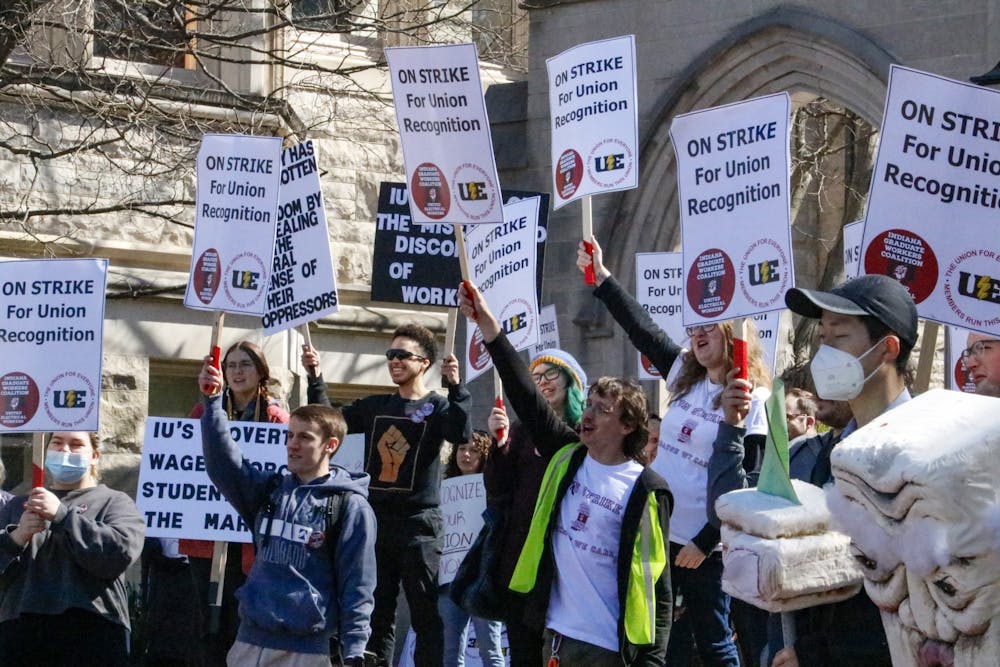The old slogan goes, “United we bargain, divided we beg!” But what if workers could do more than just bargain?
The Indiana Graduate Workers Coalition-United Electrical Workers will vote today over whether to continue last semester’s strike. While the IGWC-UE’s Coordinating Committee has recommended its members vote against authorizing a strike at this time, it’s worth reflecting upon the achievements they’ve made because of their collective action.
Because of last semester’s strike, the union gained wage increases, improved mental healthcare and an end to mandatory fees, amongst other things.
[Related: IGWC-UE will vote to continue strike Sept. 25]
The power of worker action is being demonstrated across the country, too. The past year and a half has seen massive unionization efforts at companies like Starbucks and Amazon, with workers leaving their jobs en masse in “The Great Resignation” and most recently America’s rail workers threatening to strike.
The capitalist media was hysterical over the potential rail strike. Just look at the New York Times: “How a Rail Strike Could Wreak Havoc on the American Supply Chain.” This was how they covered the rail workers’ efforts to secure themselves better working conditions and longer sick leave.
Their coverage was apocalyptic. If rail workers went on strike, supply chains would melt down, inflation would soar and shortages would worsen.
Hold on – it’s almost as if that was the point!
Perhaps the New York Times doesn’t understand the purpose of a strike, but more power to the workers is the aim, disruption the means, of collective action.
Remember how upset some students were last semester when they thought their grades might not be in on time? That’s the power of unions. And the terror in the hearts of the capitalists over the possibility of thousands of workers upending the American supply chain – that, too, is the power of unions.
Therefore, American workers everywhere must unionize. While individual workers may feel powerless on their own, when workers unite to demand what is owed to them, the capitalist class trembles.
But the reader might have gleaned from this column’s headline that there’s more to the story. Everything I’ve said about unions and strikes is true. A unionized workforce, however, still cannot solve many of the inherent problems in a capitalist economy.
Unionized workers can't do anything about the fact that capitalism is unstable. Subject to periodic crises, wherein businesses fail, workers find themselves unemployed, and society suddenly finds itself impoverished despite having the productive capabilities to provide everyone with comfortable lives.
[Related: OPINION: The rise of a new American labor movement]
Economic crisis is an unpleasant fact for capitalism, as we saw in 2020, 2008, 2001, and on and on, for as long as capitalism has existed. Even now, the Fed is moving to plunge us into a recession to fight inflation.
But even in times of relative prosperity, unions don’t change the fact that capitalist production is undemocratic and produces inequality. Capitalist production “implies the undisputed authority of the capitalist over men, that are but parts of a mechanism that belongs to him,” wrote Marx in “Capital."
Unions may give more power to their members, but at the end of the day the capitalist still controls production, still collects the profits and still decides how to spend those profits.
Unions cannot solve these problems – but a society in which the workers own the means of production in common and regulate that production via democratic planning can.
Some may suggest I’m proposing American workers fly before they can crawl. Perhaps it’s strange to advocate heaping the market economy into the trash while the modern labor movement is still finding its feet. But we’re living in strange times.
We’ve heard for the past two years about “labor shortages” and how “nobody wants to work anymore.” Now, the Federal Reserve is saying it’s necessary to sharply boost unemployment to halt inflation. A strange contradiction! What American workers should take away from all this is that the economy doesn’t work for them. But together, they can change that.
Jared Quigg (he/him) is a junior studying journalism and political science.




